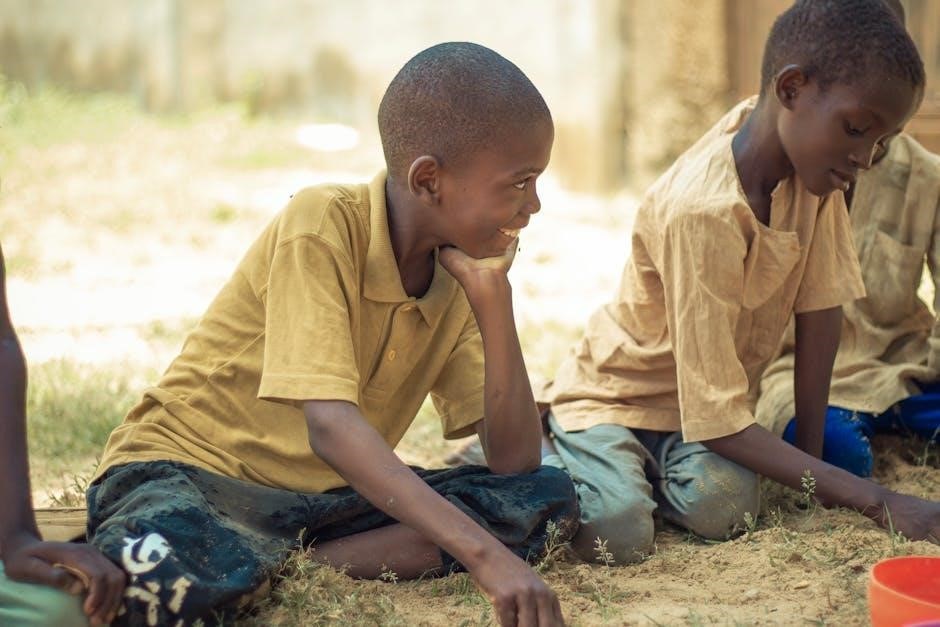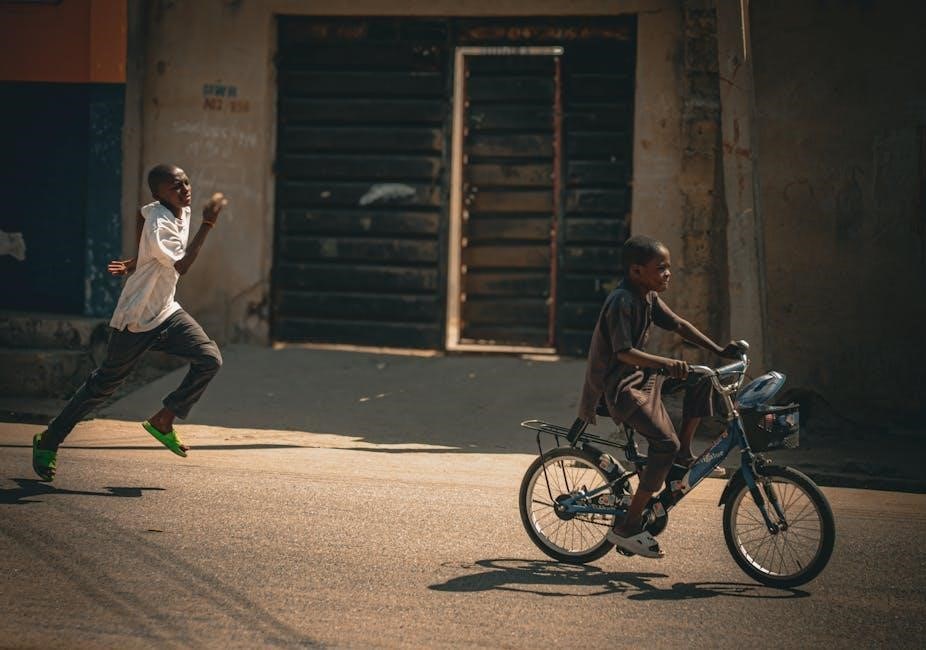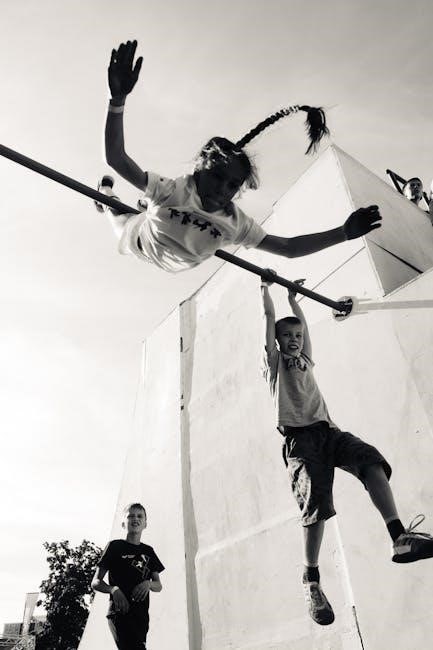Katori Hall’s The Mountaintop is a powerful play exploring Dr. Martin Luther King Jr.’s final night. Set in Memphis’s Lorraine Motel, it blends history and fantasy, offering a humanizing portrait of a legend. The play’s emotional depth and poetic dialogue have made it a modern classic, with its PDF version widely accessible for study and reflection, ensuring its message of hope and resilience endures.
Overview of the Play
The Mountaintop by Katori Hall is a poignant two-person play set in Memphis’s Lorraine Motel on April 3, 1968. It captures Dr. Martin Luther King Jr.’s final night before his assassination, blending historical facts with imaginative dialogue. The play introduces Camae, a mysterious motel maid, who engages King in a deeply personal and philosophical conversation. Hall’s script masterfully explores themes of mortality, legacy, and hope, offering a humanizing portrait of a legendary figure. The PDF version of the play is widely available, making it accessible for readers and scholars worldwide.
Historical Context of the Play
The Mountaintop is set on April 3, 1968, the eve of Martin Luther King Jr.’s assassination. The play captures the tense atmosphere of the Civil Rights Movement, with King in Memphis supporting the sanitation workers’ strike. The Lorraine Motel, where the action unfolds, holds significance as the site of his assassination. Katori Hall’s work reflects the era’s racial tensions and the weight of King’s leadership, blending historical facts with imaginative dialogue to humanize a legendary figure. The play’s context underscores the struggles and hopes of a nation in turmoil.
Significance of the Title “The Mountaintop”
The title “The Mountaintop” draws inspiration from Martin Luther King Jr.’s iconic speech, symbolizing the civil rights movement’s aspirations for equality and justice. It represents a vision of a promised land, yet to be reached, reflecting both hope and the unfinished struggle. The mountaintop embodies King’s leadership burden and the enduring legacy of his work. In the play, it captures his final reflections, blending historical significance with personal introspection, ensuring the message of resilience and justice remains timeless.
Historical Background
The Mountaintop is set during the Civil Rights Movement, focusing on Martin Luther King Jr.’s final night in Memphis. The motel setting reflects the era’s racial tensions and King’s pivotal role in the struggle for equality, highlighting the historical significance of his leadership and the impending tragedy.
Martin Luther King Jr. and the Civil Rights Movement
Dr. Martin Luther King Jr. was a pivotal leader in the Civil Rights Movement, advocating for racial equality through nonviolent resistance. His iconic speeches, including the “I’ve Been to the Mountaintop” address, highlighted the struggle for justice. The Mountaintop captures his final night, reflecting on his legacy and the movement’s challenges. The play humanizes King, showing his vulnerabilities alongside his leadership, while the PDF version ensures accessibility for educational and reflective engagement with his enduring impact on civil rights history.
The Night Before Assassination
The play captures Dr. Martin Luther King Jr.’s final hours in Room 306 of the Lorraine Motel. After delivering a powerful speech, King returns to his humble space, reflecting on his journey. The storm outside mirrors his internal turmoil, as he confronts mortality and legacy. Hall’s portrayal humanizes King, showing his vulnerabilities and fears. This poignant scene, available in the PDF version, offers a intimate glimpse into the civil rights leader’s last night, blending history with emotional depth.
Memphis and the Motel Setting
The play is set in Room 306 of the Lorraine Motel in Memphis, where Dr. Martin Luther King Jr. stayed before his assassination. The motel’s humble atmosphere contrasts with King’s larger-than-life public image, creating an intimate setting for his final hours. Memphis, a city central to the civil rights movement, serves as a backdrop for tension and reflection. The motel room becomes a symbolic space, blending history with fiction, and highlighting King’s vulnerability and humanity in his last moments.
Plot and Structure
The play unfolds in Dr. King’s motel room, where he engages with Camae, a mysterious maid, amidst a symbolic storm. Blending realism with fantasy, it captures his final reflections and the weight of his mission, creating a poignant narrative of humanity and legacy.
Key Scenes and Dialogue
The Mountaintop features poignant scenes that capture Dr. Martin Luther King Jr.’s humanity. A pivotal moment occurs when King reflects on his life, revealing vulnerability. Camae’s arrival sparks dynamic dialogue, blending humor and depth. Their conversations explore themes of race, hope, and mortality. The play’s climax, with a prophetic vision, underscores King’s legacy. These scenes, rich with emotional resonance, highlight Hall’s mastery of dialogue, making the PDF version a vital resource for studying the play’s dramatic and thematic elements.
The Role of Camae
Camae, the mysterious maid in The Mountaintop, plays a pivotal role in unraveling Dr; King’s vulnerabilities. Her arrival in Room 306 sparks a divine connection, blending reality with fantasy. Camae’s sharp wit and prophetic insights challenge King, revealing his fears and hopes. Her character serves as a catalyst for introspection, humanizing the iconic leader. Through her interactions, Hall explores themes of mortality and legacy, making Camae an enigmatic figure who transcends her role as a motel maid. Her presence is both grounding and otherworldly, adding depth to the narrative.
The Storm as a Symbolic Element
The storm in The Mountaintop serves as a potent symbolic backdrop, mirroring the turmoil and tension of Dr. King’s final hours. It reflects the internal and external conflicts he faces, embodying the chaos of the civil rights movement. The storm’s intensity heightens the play’s emotional stakes, symbolizing impending tragedy and divine communication. Through its rhythmic presence, the storm underscores the fragility of life and the weight of legacy, creating a haunting atmosphere that amplifies the play’s dramatic and thematic depth;

Characters and Character Development
Dr. Martin Luther King Jr. is portrayed with vulnerability and humanity, while Camae, the mysterious maid, challenges his resolve. Their dynamic drives the play’s emotional depth and introspection.
Dr. Martin Luther King Jr.
In The Mountaintop, Dr. Martin Luther King Jr. is portrayed as a complex, human figure, beyond his iconic status. The play captures his vulnerability, exhaustion, and introspection on the eve of his assassination. King’s dialogue reveals his fears, doubts, and deep commitment to the civil rights movement. His interactions with Camae expose a man grappling with mortality and legacy, offering a poignant exploration of his final hours. This portrayal humanizes a legend, emphasizing his emotional and spiritual depth.
Camae: The Mysterious Maid
Camae, the enigmatic motel maid, plays a pivotal role in The Mountaintop. Her arrival in Dr. King’s room sparks a dynamic interaction, blending humor and profundity. Camae’s character transcends her role as a maid, representing divine intervention or a metaphor for the voices of everyday people. Her sharp wit and boldness challenge King, humanizing him and revealing his vulnerabilities. The PDF version of the play highlights her significance, as her presence pushes King to confront his legacy and mortality, making her an integral part of the narrative’s emotional and spiritual journey.
Character Interactions and Dynamics
In The Mountaintop, the dynamic between Dr. Martin Luther King Jr. and Camae drives the narrative. Their conversations are layered with tension, humor, and vulnerability, revealing King’s humanity. Camae’s boldness contrasts with King’s weariness, creating a compelling interplay. The storm outside mirrors their emotional turbulence, while their dialogue exposes deeper truths about identity, mortality, and hope. These interactions humanize King, showcasing his fears and doubts, and highlight Camae’s mysterious role in his journey. Their connection is both intimate and symbolic, enriching the play’s emotional depth.
Themes and Messages
The Mountaintop explores themes of race, identity, and hope, offering a poignant reflection on Dr. King’s legacy. The play’s emotional depth and poetic dialogue highlight redemption and mortality, resonating deeply in its PDF version for modern audiences.
Race and Identity
The Mountaintop delves deeply into themes of race and identity, portraying Dr. Martin Luther King Jr.’s internal struggles with his role as a leader in the Civil Rights Movement. The play highlights the weight of racial injustice and the personal toll it takes on individuals. Through King’s interactions with Camae, the mysterious maid, the play explores the complexities of Black identity and the collective struggle for equality. Hall’s dialogue underscores the tension between hope and despair, offering a poignant reflection on the ongoing fight for racial justice in America.
Hope and Redemption
In The Mountaintop, hope and redemption are central themes, as Dr. King confronts his mortality and legacy. Through his dialogue with Camae, the play reveals his visions of a better future, blending despair with resilience. The storm outside symbolizes turmoil, yet King’s words inspire hope for racial equality and justice. The play’s emotional depth and poetic language underscore the transformative power of redemption, offering audiences a profound reflection on humanity and the enduring struggle for a harmonious society. Its message remains timeless, resonating deeply in contemporary discussions of race and identity.
Mortality and Legacy
The Mountaintop profoundly explores Dr. Martin Luther King Jr.’s mortality, juxtaposing his historical significance with personal vulnerability. The play captures his final hours, revealing fears and doubts, while emphasizing his unwavering commitment to justice. King’s legacy is portrayed as a beacon of hope, transcending death. The PDF version of the play highlights these themes, allowing readers to reflect on his impact and the ongoing struggle for equality. Through its poignant portrayal, the play ensures King’s legacy endures, inspiring future generations to continue his fight for a just society.

Production and Staging
The original production of The Mountaintop premiered in London, earning critical acclaim. Its Broadway debut solidified its impact, with intimate staging capturing the motel room’s simplicity and tension, enhancing the play’s emotional depth.
Original Production and Premiere
The original production of The Mountaintop premiered in London at the Theatre503 in 2009, directed by James Dacre. It later transferred to the West End, earning critical acclaim and winning the Laurence Olivier Award for Best New Play. The Broadway premiere followed in 2011, starring Samuel L. Jackson as Dr. King and Angela Bassett as Camae. This production was praised for its bold storytelling and emotional depth, solidifying the play’s reputation as a modern theatrical masterpiece. Its success led to widespread recognition and numerous stagings worldwide.
Broadway Production
The Broadway production of The Mountaintop was a landmark achievement, produced by Jean Doumanian, Sonia Friedman Productions, and others. It brought Katori Hall’s visionary play to a wider audience, showcasing Dr. Martin Luther King Jr.’s humanity. The production received critical acclaim for its powerful performances and emotional depth. Its success highlighted the play’s universal themes, making it a significant moment in theater history. The Broadway staging emphasized the play’s relevance, ensuring its message resonated with contemporary audiences and solidified its place as a modern classic.
Notable Stagings and Reviews
The Mountaintop has garnered acclaim across various productions. The Dallas Theater Center’s staging, directed by Akin Babatunde, was praised for its emotional depth. Controversy arose when an Ohio production cast a white actor as MLK Jr., sparking debates on representation. The play’s PDF version has enhanced accessibility, allowing global audiences to engage with its powerful narrative. Reviews highlight its bold originality and poignant portrayal of King’s humanity, solidifying its place in contemporary theater. Its ability to provoke dialogue underscores its cultural significance and enduring relevance.

Critical Reception
The Mountaintop received critical acclaim, winning the Laurence Olivier Award for Best New Play. However, some productions faced controversy, such as criticism over casting choices.
Awards and Accolades
The Mountaintop has garnered significant recognition, including the prestigious Laurence Olivier Award for Best New Play. Its Broadway production also received critical acclaim, solidifying its place in contemporary theater. The play’s success lies in its bold storytelling and emotional depth, earning it a Modern Classics edition. Its PDF version has further expanded its reach, making it accessible for educational and theatrical purposes worldwide. This acclaim underscores its enduring impact on both audiences and the theater community.
Positive Reviews
The Mountaintop has garnered widespread acclaim for its bold storytelling and emotional depth. Critics praise its poetic dialogue and innovative portrayal of Dr. Martin Luther King Jr. The play’s ability to humanize a historical icon while blending realism with fantasy has been highlighted as a standout feature. Audiences and reviewers alike commend its thought-provoking themes and the powerful dynamics between King and Camae. The PDF version has further expanded its reach, making it accessible for educational purposes and fostering deeper engagement with its poignant message.
Mixed and Critical Responses
While The Mountaintop has been praised for its originality, some critics questioned its portrayal of MLK Jr., particularly the casting of a white actor in the role, sparking controversy. The play’s surreal elements and two-person dynamic divided audiences, with some finding it emotionally resonant and others struggling with its unconventional approach. Despite this, the PDF version remains a valuable resource, offering insights into Hall’s vision and the play’s historical significance. Mixed responses highlight the complexity of depicting a legend while balancing artistic freedom and historical accuracy.

Cultural Impact
The Mountaintop has sparked vital conversations about race, identity, and representation. Its PDF version ensures accessibility, making it a tool for education and reflection on civil rights history;
Representation in Theater
The Mountaintop has become a significant work in contemporary theater, offering a fresh perspective on historical figures and marginalized voices. Its two-person format challenges traditional stage dynamics, while its exploration of race and identity resonates deeply. The play’s success has inspired diverse productions, including regional theater adaptations, ensuring its message reaches a broad audience. The availability of the PDF version has further expanded its accessibility, making it a vital tool for educational and theatrical exploration. Its impact continues to spark conversations about representation and storytelling in modern theater.
Controversies and Discussions
The play sparked debate over racial representation when a white actor portrayed MLK in an Ohio production, prompting criticism from Katori Hall. This highlighted tensions around casting and authenticity, fueling discussions on race and theater. The PDF version of the play circulates widely, making it accessible for analysis, yet controversies persist, reflecting broader societal issues. These debates underscore the play’s relevance and its ability to provoke meaningful conversations about identity and representation in modern theater.
Educational Significance
The Mountaintop holds profound educational value, offering insights into civil rights history and Dr. King’s humanity. Its PDF version is widely used in classrooms, enabling students to explore themes of race, identity, and social justice. The play sparks critical discussions about leadership and legacy, making it a vital tool for teaching historical context and fostering empathy. Its accessibility ensures that future generations can engage with King’s story, promoting a deeper understanding of his impact and the ongoing struggle for equality.

Adaptations and Interpretations
The Mountaintop Play PDF offers a convenient format for studying Katori Hall’s work. Modern stagings reinterpret the play, blending historical themes with contemporary perspectives, ensuring its relevance endures.


PDF Version and Accessibility
The PDF version of The Mountaintop play has enhanced its accessibility, allowing global audiences to engage with Katori Hall’s work. This format ensures the play’s themes of race, hope, and mortality reach students, scholars, and theater enthusiasts worldwide. The PDF includes forewords and introductions, enriching understanding. Its digital availability has made it a vital resource for educational purposes, fostering discussions on civil rights and social justice. This accessibility underscores the play’s enduring relevance in contemporary society and education.
Modern Interpretations

Modern interpretations of The Mountaintop highlight its relevance in contemporary discussions on race and identity. The play’s PDF version has made it accessible for educational purposes, allowing universities and theater groups to explore its themes. Directors often emphasize the duality of King’s public persona and private struggles, while actors bring fresh depth to characters like Camae. The play’s poetic dialogue and symbolic elements, such as the storm, are reimagined to resonate with modern audiences, ensuring its message of hope and resilience remains timeless.
Comparisons with Other Works
The Mountaintop is often compared to other works exploring civil rights themes and historical figures. Like plays about Malcolm X or Rosa Parks, it humanizes icons, offering intimate perspectives. Its blend of history and fantasy sets it apart, much like Hamilton reimagines American history. The play’s poetic dialogue and emotional depth evoke comparisons to August Wilson’s works, while its focus on a pivotal moment mirrors The Diary of Anne Frank. The PDF version highlights its accessibility for modern readers and scholars, ensuring its themes resonate widely.
The Mountaintop remains a poignant exploration of MLK’s legacy, blending history and fantasy. Its PDF version ensures accessibility, preserving its powerful message for future generations to reflect and learn.

Legacy of the Play
The Mountaintop has left an indelible mark on theater, celebrated for its bold portrayal of MLK Jr.’s humanity. Its PDF version ensures accessibility, fostering educational and cultural dialogue. The play’s success, including its Olivier Award win, highlights its enduring relevance. Productions worldwide, from London to Dallas, showcase its universal appeal. By blending history with fantasy, it challenges audiences to reflect on race, identity, and legacy, cementing its place as a modern classic and a vital tool for understanding civil rights history and its contemporary resonance.
Relevance in Contemporary Society
The Mountaintop remains a poignant reflection of modern societal struggles, addressing race, inequality, and the pursuit of justice. Its themes of hope and resilience resonate deeply, encouraging dialogue on civil rights and social change. The play’s exploration of Dr. King’s humanity underscores the ongoing fight for equality, making it a vital tool for education and reflection. The PDF version ensures accessibility, allowing new generations to engage with its powerful message and continue the conversation about justice and unity in today’s world.
